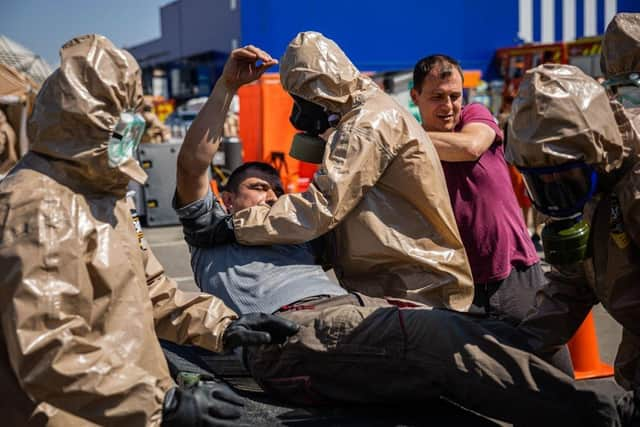War in Ukraine: ‘The day has come’: Ukraine and Russia accuse each other of dangerous shelling near nuclear plant as UN inspectors arrive in bid to avert disaster
Yet, as a delegation of United Nations officials make their way to the Zaporizhzhia nuclear power station in south-eastern Ukraine to carry out an inspection at the site in a bid to avoid a major disaster, fighting still continues, with both sides blaming the other for reckless attacks in the region.
Both sides have accused each other of shelling around the Russian-occupied plant, which is still being operated by Ukrainian workers.
Advertisement
Hide AdAdvertisement
Hide Ad“[Russia is] blackmailing the whole world with the possibility of a nuclear disaster,” Hryhoriy Plachkov, former head of the State Nuclear Regulatory Inspectorate of Ukraine, has warned. The inspectorate issued another warning this weekend that any major radiation leak in coming days could see a toxic nuclear plume sent over south-eastern Ukraine and into Russia.


Ukraine – as well as other neighbouring countries such as Belarus – is still experiencing the legacy of the Chernobyl disaster in 1986, when technicians at the nuclear reactor in northern Ukraine attempted to execute a flawed experiment. The actions of the technicians resulted in a fireball that blew off the heavy steel and concrete of the reactor, spreading nuclear contamination across Europe.
The Zaporizhzhia plant, about 340 miles south-east from the capital of Kyiv, is the largest in Europe and among the ten biggest in the world, accounting for roughly a fifth of Ukraine’s electricity generation. Ukrainian officials previously warned that any explosion resulting from shelling could be “ten times bigger than Chernobyl”.
The long-awaited UN delegation, headed by Rafael Mariano Grossi, director general of the International Atomic Energy Agency, comes as Ukrainian authorities began to hand out iodine tablets to people living in the area around the plant.
"The day has come,” Mr Grossi said on Twitter, posting a picture of the 14-strong team heading to Ukraine on Monday. “We must protect the safety and security of Ukraine’s and Europe’s biggest nuclear facility.”
The team, which will be led by Mr Grossi, will assess physical damage to the plant, determine how well its safety systems are functioning, evaluate working conditions for its staff and perform any urgent safeguard activities.
Volodymyr Marchuk, a spokesman for the Zaporizhzhia Regional Military Administration, said recipients were being told not to take them preventatively, adding they were “being distributed in case of any future radiation leak, at which time the government would instruct people to take the tablets”.
If a radiation leak did occur, it could have consequences for not only mainland Europe, but also in Scotland. Following the Chernobyl disaster, Scotland was affected by fallout that spread.
Advertisement
Hide AdAdvertisement
Hide AdRestrictions on Scottish sheep movements due to contaminated soil remained in place until 2011, while environmentalists have warned radioactive isotopes from Chernobyl still show up in fish and marine sediments around Scotland.
Although this plant is further south in Ukraine than Chernobyl, any nuclear plumes could be widespread, depending on wind direction and other environmental factors.
Following Chernobyl, residents in the area around the plant, as well as those living in neighbouring Belarus, suffered serious thyroid issues. Until recently, the British Foreign and Commonwealth Office advised visitors to Belarus should avoid eating locally produced forest fruits and dairy, due to a risk of high levels of radiation.
Although Russia occupied the plant in March, fighting intensified over the summer. It is regarded as a key target, not only because of the potential consequences if fuel reactors are damaged, but because of the amount of energy it supplies to the rest of the country.
World leaders have condemned military action. The United Nations warned at a meeting of the Security Council last week that it was “gravely concerned” by the situation.
Ukrainian president Volodymyr Zelensky said on Thursday that Russia had “put Ukraine and all Europeans in a situation one step away from a radiation disaster".
Yet both sides blame each other for military action in the area.
Russia on Monday refused to demilitarise the area. Kremlin spokesman Dmitry Peskov, said such action was "not being discussed now". Russian troops have occupied the plant since early March.
Advertisement
Hide AdAdvertisement
Hide AdLast week, the plant was disconnected from the power grid. Ukraine said Russian shelling sparked fires in the ash pits of a nearby coal power station, while a Russian official claimed Ukraine was to blame.
Meanwhile, Ukrainian media reported Russian troops on Sunday shelled the town of Enerhodar – just a few kilometres from the nuclear site – injuring ten people.
Russia has released photographs which it claimed showed the roof of the plant building, which stores nuclear fuel, was pierced following a Ukrainian strike. Soon afterwards, however, operators of the plant issued a statement saying radiation levels were normal.
Russian state media also claimed forces had shot down a Ukrainian drone that was trying to attack the plant.
"Pressure on the Ukrainian side to stop shelling can reduce military tension," Mr Peskov added, when asked what Moscow would like to see done to de-escalate the situation at the power station.
"All countries are obliged to put pressure on Ukraine so that it stops exposing the European continent to danger," he said.
Even China – a quiet ally of Russia – issued warnings over the potential consequences of damage to the plant.
Geng Shuang, China’s deputy permanent representative at the UN, warned just one incident might cause a serious nuclear accident “with irreversible consequences for the eco-system and public health of Ukraine and its neighbouring countries”.
”We must not allow the tragedies of the Chernobyl and Fukushima nuclear accidents to be repeated,” he said.
Comments
Want to join the conversation? Please or to comment on this article.
